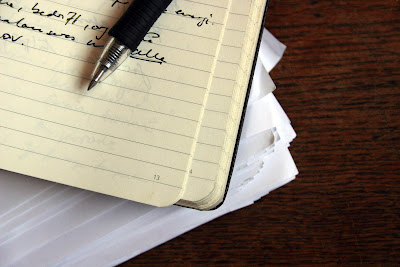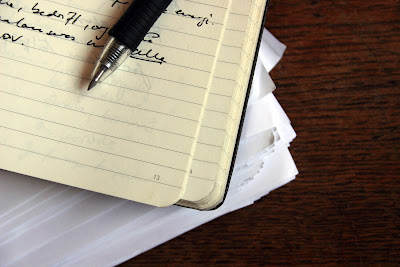Writing as a daily practice adds up quickly even if you don’t have the time to write full time.
It also is great for building momentum– it keeps the story fresh and allows your everyday inspiration to create sometime big over time.
Here are seven steps to get writing every day:
1. Find the best time to write.
The best time for me is every morning as soon as I wake up. My creative mind is up and the critic is still sleeping. Yes!
Do you need to do it at 10? After lunch? Late afternoon? Middle of the night? When have you written some of your best work?
To write consistently, you may need to change your schedule. Believe me, I like to sleep in. This is a commitment to my writing.
2. Set a daily or session goal.
I also set low and easily reachable goals for myself. For me it is three pages a day.
If I feel inspired, I can always go over. If not, no big. Satisfaction with my daily progress motivates the next day’s work.
This may be different for everyone. But I know if I have twenty minutes when I wake up, I can blast out three pages of draft.
Make it a SMART goal.
3. Keep track.
I use a spreadsheet to organize everything. I keep track of whats been done on what day and how close I am to my monthly goal.
Sure sometimes a day or a week goes by unproductively. But I have never written a month full of zeroes, I’ll tell you that.Check out this free Excel spreadsheet.
4. Write always.
When I don’t have a project I just write about whatever is on my mind, be it grocery lists or that niggling memory from high school. But I still have to write my three pages.
This is a good exercise for a writer, or any artist. Life feeds creativity. If I’m blocked, there is something obstructing my creativity. I’ve got to let that out somehow– so why not use the craft at hand?
When I’m working on a project and stuck, I work on a letter to my self or a reader.
I start “Dear —” and just start typing about my ideas for the project, where I’m having trouble, etc. Fitting the puzzle pieces together is just as productive as writing a draft.
 |
| A list of random ideas and a pocket! Wren’s different project notebooks |
5. List unrelated goals or ideas as they come.
I can’t write with a dozen other things in my head. This is what corners are for.
When things pop up (and they will when the creative juices flow), I write them down in the corner and move on.
These could be chores, ideas for another scene, a new genre to write in, the event I forgot to prepare for, whatever.
If it doesn’t come next in my scene, I write it and forget it for now. After I meet my goal, then I can organize all that stuff.
6. Keep paper and pen handy.
Always!! Keep a pad in the bathroom somewhere, in the kitchen, in the car, everywhere.
Everyday rituals are when my creative mind is free to think of great ideas. Showers, driving to work, putting my shoes on, doing the dishes…
I never know when I’ll have a minute of free time. The notebook in my wallet is super small, but it will record that cool short story idea I get in the grocery aisle.
Sometimes I sleep in. Those days, I cram writing in the cracks of my day. It’s a little more stressful, but the writing happens.
7. Share your success and your problems.
For accountability I share my progress with the #wipmadness group on twitter. Every week there is a blog post where we catch up with each other.
There are many forms to do this: twitter hashtags, forums, other people’s blogs, your blog, facebook groups, critique groups, and meetup groups.
There is a balance. This accountability method needs to work for the writing– not distract. Ahem..social media!
I like to have my own space so twitter works for me. If someone called me up to bug me about my writing, the pressure would probably stress me out too much to write any. But that’s me.
What helps you to write everyday? Let me know in the comments.
Want to learn more about writing? Receive all my writing articles automatically in your inbox by joining here
 Learn How to Get Support and Accountability from a Partner
Learn How to Get Support and Accountability from a Partner




















Comments on this entry are closed.
This is an inspiring and very helpful post Wren – many thanks.
Darla’s spreadsheet is also a very useful looking tool… Normally the very word spreadsheet has me running for the hills, but this may be a new beginning.
Sincere thanks again.
Sean.
http://wettedashes.blogspot.co.uk
Hey glad to help, Sean, using a spreadsheet can really be as simple as typing in your days count. Thankfully darsba has done the rest!
Good luck with your writing
By the way I wasn’t sure where to leave a comment but your website is really cool
I’m working on the whole Comments thang… Bit of a mystery.
Glad you liked the site, Wren.
Hi, Wren — Thanks for sharing my word count spreadsheet in your post. I’m glad it’s helpful to you and other writers. Bravo to you for being committed to writing first thing in the morning. I’m a night writer, but I’d use the morning if not for my day job.
Hey there thank you for offering a nice spreadsheet! I can alter things to fit but I’ve never taken the time to create my own.
Yeah I’m often to wrecked at night as some days at work are very long.
Thank you for sharing and dropping by 🙂
My pleasure. You’ll find the spreadsheet at DarlaWrites.com, my blog for new writers, but I couldn’t log in here with that website. I used my Darsba profile and that’s the site of my writing collection.
Tasty and effective notes.
Thanks also for the clear, bright layout of your blog…even that alone is refreshing.
Thank you! I’ve been working on this idea for a couple weeks to make it the best possible post 🙂
You know, everything you’ve listed here is fantastic. And what I am finding lately is using a notebook also helps. I spend a whole lot of time on the computer…and I love my computer. But when I sit with a notebook and write out randoms, or pretend I am a character and it is her/his notebook, or whatever it is a different energy and am now in the habit of using it daily. Thanks for you post..love it.
Thank you so much for your reply! I love paper notebooks–the paper feels great under a pen, they can kindof be a bit of everything (love table of contents), are more readily read over in total, and are great to look at on a shelf. I’ve been writing a draft in a notebook and it’s so satisfying to see how much I’ve written over time.
This is great advice! I really should develop better writing habits.
thanks! you know lots of creative people dont like structure– but it makes things flow steadily. Just a few changes can multiply your productivity.. since writing this post I have gotten a critique partner to hold me accountable and it has been a huge bump up in the completion of my coming of age story.